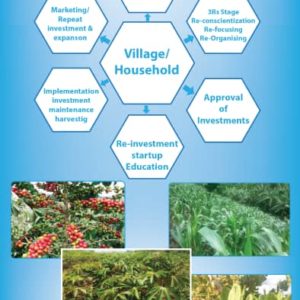Poverty Reduction Program (PORP)

GLOFORD has recently created the Poverty Reduction Program (PORP) to respond to the World’s greatest challenge of all times; poverty. The region where GLOFORD is working has been bedeviled by absolute poverty with millions of women and men grappling with the tumultuous impact of chronic poverty. Children are not accessing quality education, majority are malnourished, dreams of young people are shattered, and the quality of lives are squalid and devastating.
In this new indicative, GLOFORD is partnering with development partners, local government leaders, and communities to fight absolute poverty through its innovative Poverty Reduction Program-PORP. GLOFORD is currently running poverty reduction progams in Lango sub region staring with Lira, Alebtong, and Kole districts and expanding where at least 2,500 rural smallholder farmers and households are being targeted through agribusiness interventions where they are engaged in production of short term and long term commercial crops as well as empower them as entrepreneurs and investors.
The Lango sub region is predominantly Lango people and speak the Lango dialect. According to the 2014 Uganda national census, Uganda had a population of at least 2.1 million and was among the top six most populated tribes of the more than 40 tribes resident in Uganda. The Lango people are Nilotic ethnic group of Northern Uganda. According to their oral traditions, they originated from Abyssinia present day Ethiopia and from Israel prior to arriving in Ethiopia. In his book “The Tri-century of Lango people in Uganda” 2013 by Julius Peter Odwee cited by Wikipedia, he traces the migration of the Lango tribe right through Otuke hills and mentions several similarities between Lango culture and their Ateker neighbours. He continues to assert that the Lango acquired adopted a mixture of the Luo Nilotic dialect as a language due to intermarriage between the Lango and the Luo speaking neighbours. The community are conservative straight sexual oriented people are majority Christians.
Progress in reducing poverty has been much slower in Lango sub region in Northern Uganda. The region was devastated by many conflicts including the Lord’s Resistance Army war for at least two decades and is recovering from the mayhem of war but struggling to develop. Accordingly to the World Bank poverty assessment report of December 2016, the proportion of the total number of poor people who live in poverty in Northern Uganda where Lira is one of the 26 districts, increased in poverty rating between 2006 and 2013, from 68% to 84% respectively. Also, the report recorded that households in Uganda’s Northern region is among those regions with much lower levels of human capital, fewer assets, and more limited access to services and infrastructure than households in the Central and other regions of Uganda. For example, electricity is almost non-existent in the Northern Uganda, where the proportion of households with access stands at 3.7% only. This is far lower than 32.3% recorded for the Central region. Finally, about 29% of households in Northern Uganda do not use any type of toilet facility. This is far higher than corresponding figures for Eastern, Western and Central regions at 8%, 2%, and 5% respectively. In Lango sub region where the project will be implemented, the poverty rate stands at 17.6%. With this statistics, the situation is worst for women including young women and youth.
Imagine a region that deprived girl child education for centuries, where women and youth don’t own productive assets like land etc; implies they are squatters on man’s land and if a man doesn’t offer good leadership, the family continues to sink into the abyss of poverty and deprived well-being.
GLOFORD aspires to walk alongside the communities to rebuild the once devastated society, regain livelihoods, and empower the deprived communities living in poverty with enhanced agribusiness capabilities necessary to unlock their investment potential activated through increased income security leading to poverty reduction through productivity of market ready crops and market linkages for smallholder farmers in GLOFORD serving communities and nations.

